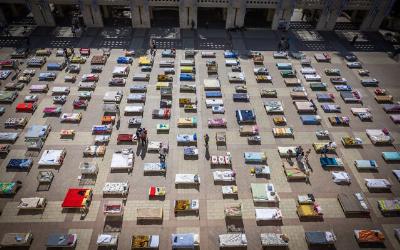Share
Human Rights Voices
While the UN devotes its human rights operations to the demonization of the democratic state of Israel above all others and condemns the United States more often than the vast majority of non-democracies around the world, the voices of real victims around the world must be heard.
Palestinian Authority/Gaza, October 31, 2023
In Jerusalem, Hundreds Of Empty Beds And Cribs Bring Home Enormity Of Hostage Crisis
Original source
In Jerusalem’s Safra Square, 230 empty beds are laid out surrounded by the buildings of City Hall — cribs hung with mobiles alongside queen-size beds with night tables and piles of books, toddler beds strewn with puzzles, picture books and pajamas, and plenty of twin beds too.
The installation, called “Empty Beds,” symbolizes the Israeli hostages held in Gaza since October 7, when Hamas terrorists staged an assault on Israeli border communities and an outdoor music rave, killing some 1,400 people, wounding thousands and kidnapping hundreds.
Since the installation was set up, the number of confirmed hostages has grown to at least 243.
The bed installation was set up by Bring Them Home Now, a volunteer organization supporting the families of the hostages and the missing, with help from art students at the nearby Bezalel Academy of Arts and Design.
At 3 p.m. Monday, representatives of the missing and those held captive lined up around the perimeter of the beds for a moment of silence, then softly sang the national anthem “Hatikva” — the hope.
Just minutes earlier, everyone in the square ran to nearby bomb shelters as a siren sounded, warning that rockets had been fired from Gaza at Jerusalem.
Back in the square, family members congregated in groups around the beds, speaking to one another, to the press, and to Jerusalem Mayor Moshe Lion about their current routines.
“We’re in Eilat together as much as possible,” said Nevia Heiman, 15, who, like her first cousin Lotem Mina, 14, was wearing white Nir Oz T-shirts made for all the surviving members and extended families of the decimated kibbutz.
The two cousins live in Haifa and Kiryat Warburg, and have been regularly visiting their family in Eilat, where all surviving members of Nir Oz were evacuated, mourning and holding out hope for those who were abducted.
Heiman and Mina were part of the family group representing Ditza Heiman, their 84-year-old grandmother, who has lived on Nir Oz since she was 18 and makes chicken soup every Shabbat for her extended family.
It was there that she met their grandfather and married, had four kids and then was widowed young, when Lotem’s mother was just six.
Now she has 12 grandkids, five great-grandchildren, and two daughters who live nearby, but not in Nir Oz. They were all supposed to eat chicken soup and hamin, a long-cooked meat and bean stew, together on the Shabbat afternoon of October 7, which was also the holiday of Simchat Torah.
Heiman’s children and grandchildren were in touch with her that morning when Hamas struck.
Neighbors reported seeing her being walked to a car by terrorists, before she was presumably taken to Gaza.
Nir Oz was one of the hardest-hit communities in the October 7 massacre, said Erez Adar, who grew up on Nir Oz and whose 85-year-old mother, Yaffa Adar, and 38-year-old nephew, Tamir Adar, were also abducted.
“One out of every four people is gone,” said Adar. “There were hundreds of terrorists throughout the kibbutz; other kibbutzim had dozens and here there were hundreds.”
Much of his extended family lives on Nir Oz, including his mother, five of her eight grandchildren and six great-grandchildren.
He stopped to speak to a couple who wanted to express their support.
“I brought cookies,” said one woman, who approached Adar and his wife, Adrienne, as they stood holding posters of his mother and nephew. “What else can we do? Can we make you dinner?”
“That’s okay,” said Adrienne, gently, smiling at the couple. “We’re okay.”
“People want to help, but there aren’t that many tools to do so,” said Yair Moses, whose parents, Gadi and Margalit Moses, long divorced but both still living on Kibbutz Nir Oz, were both taken captive 24 days ago.
“So they help in any way they can, like with this kind of thing,” he said, pointing at the installation of beds. “It’s very vivid, and it also offers us access to the media, and that’s important.”
Gadi Moses, a well-known agronomist who taught farmers from developing countries how to grow crops in sandy soil, was taken along with his partner, Efrat Katz, her visiting daughter Doron Katz Asher and two little granddaughters. The five were taken separately. The family found out days later that Efrat had been killed by gunfire on the way into Gaza.
The family hasn’t heard anything since from Gadi. Yair’s mother, Margalit, lives alone on the kibbutz and was later glimpsed in a Hamas video, being taken on her mobility scooter into Gaza.
HIs sister Moran lives with her family on the kibbutz but their front door somehow got stuck and the terrorists couldn’t enter their home. She’s now in Eilat with the rest of the surviving evacuees from Nir Oz.
“It’s like a tight hug in Eilat right now,” said Amir Elfasa, whose aunt Maya Goren was abducted, while her husband, Avner was killed and their four children survived.
“We try to hold them as much as possible,” he said.

